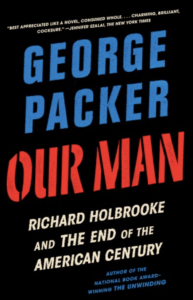Bull in a China Shop: Richard Holbrooke, Belligerent Peacemaker
The supremely gifted and fatefully flawed diplomat died in 2010 after collapsing in the office he never got to occupy. A new biography unfurls the backstory.

Our Man: Richard Holbrooke and the End of the American Century
By George Packer
Penguin Random House/May 2019
Reviewed by Lisa Van Dusen
May 30, 2019
During the years I worked in the United States, I only ever participated in one tactical operation involving the late diplomat Richard Holbrooke. It was stealthy and highly sensitive; a mission of such a top secret nature that not even Holbrooke himself was aware of it.
It happened while I was working as the international writer for Peter Jennings at ABC World News Tonight where, late one afternoon, something akin to an electrical charge enervated the “rim” where the handful of executive producers and writers as well as the anchor himself toiled. It was transmitted by email and registered through cocked eyebrows, face palms and other barely restrained signs of alarm to which Jennings, banging out a script with his back to us, was utterly oblivious. I looked across the rim at a colleague with a silent “What’s up?”
“Holbrooke is coming,” was the cryptically ominous email response.
The fact that Holbrooke was coming to do an interview elsewhere in the building was, it transpired, a problem. Not because there was an international crisis afoot but because Holbrooke had, some years earlier, absconded with (and later married) Kati Marton, the lovely and talented author who was still tenuously married to Jennings at the time (Marton herself has written about this pas de trois in her memoir, Paris, a Love Story). Jennings could not abide being in the same room with Holbrooke and vice-versa, a logistical complication which, given the oxygen consumed by both men in any room, would likely have applied with or without the romantic rivalry.
There ensued an elaborate, covert effort to prevent the two notoriously hotheaded alpha males from invading each other’s lines of vision. Throughout the broadcast as we sat on the set, the movements of the then-ambassador to the United Nations were reported at regular intervals by strategically assigned lookouts along his perambulation route. Finally, Holbrooke left the building, the coast was clear and whatever would have happened otherwise — Fisticuffs? A hallway glare-off? A dominance-delineating spraying contest?— had been successfully averted.
The negotiating genius who brokered the 1995 Dayton Accords that ended the war in Bosnia was, it turns out, complicated, high maintenance and not a terribly good judge of his own threat environment.
There seem to be many such stories about Holbrooke who, per the new biography Our Man: Richard Holbrooke and the End of the American Century by George Packer, aroused similar turbulence wherever he went, sometimes for reasons that had nothing to do with his wife-snatching proclivities.
Holbrooke, who died in 2010 at the age of 69 after collapsing during a meeting with his boss, then-Secretary of State Hillary Clinton, was that rarest of Washington creatures, an ass-kissing self-promoter who somehow also managed to alienate multitudes on his way to inevitable success and global recognition. The book chronicles the hairpin trajectory produced by that unlikely recipe for advancement as a cavalcade of snubs, feuds, rivalries, grudges, proxy shivvings and passive-aggressive score-settlings (not all of them Holbrooke’s, some of them not even the author’s) that reads like the superpower policy brain trust version of The Burn Book in Mean Girls. The negotiating genius who brokered the 1995 Dayton Accords that ended the war in Bosnia was, it turns out, complicated, high maintenance and not a terribly good judge of his own threat environment.
That Holbrooke isn’t around to defend himself seems almost immaterial since, in many ways, Our Man really isn’t about him. It’s about, as the subtitle suggests, the difficulties of policy making, the perils of imperial hubris and how America spent its post-Cold War advantage. Also, the gratuitous trashing of some reputations and equally gratuitous inflation of others. The stature most depleted is Holbrooke’s, an avatar for a worldview currently being systematically obliterated without anyone transparently expediting that process elaborating on what might replace it or how its demise will affect humanity.
That the American century’s brashest diplomat should be branded an ass for posterity at a time when diplomacy itself is being sidelined by less refined methods isn’t a shock.
The question is, whose century is it now?
Lisa Van Dusen is associate editor of Policy Magazine. She was Washington columnist for the Ottawa Citizen and Sun Media, international writer for Peter Jennings at ABC News, and an editor at AP National in New York and UPI in Washington.
